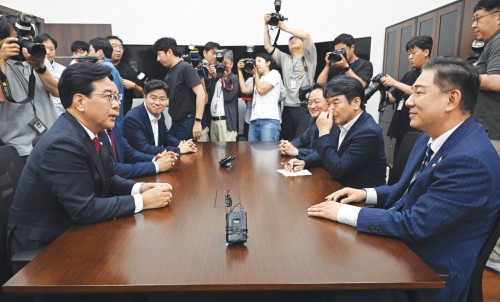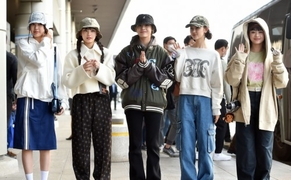 |
| Kim Byung-ki, acting leader and floor leader of the Democratic Party (far right), and Song Eon-seok, floor leader of the ruling People Power Party (far left), talk during a meeting at the Democratic Party’s floor leader’s office at the National Assembly in Seoul on June 18 to discuss the supplementary budget bill. / Source: Song Ui-joo, Yonhap News |
The Lee Jae-myung administration has drawn up a second supplementary budget totaling over 20 trillion won. The budget includes a universal relief payment program and allocations for local currency, a key campaign pledge of President Lee. Funds to support small business owners, low-income earners, and vulnerable groups are also part of the package. With President Lee stressing the urgent need for economic recovery more than ever, the Democratic Party is expected to review and pass the supplementary budget swiftly.
On Wednesday morning, Democratic Party (DP) Policy Chief Jin Sung-joon, Presidential Policy Office Director Kim Yong-beom, and Acting Finance Minister Lee Hyung-il held a closed-door policy meeting at the National Assembly. During the meeting, the party and government reached agreements on major items, including the size of the supplementary budget and how the relief funds would be distributed.
Jin stated, “The government will announce the exact size of the budget separately,” but noted that “it is close to the 35 trillion won target the party proposed earlier this year.” Given that the first supplementary budget in May amounted to 13.8 trillion won, the second round is projected to exceed 20 trillion won.
The centerpiece of the package—the relief fund for economic recovery—will be distributed universally, with additional support for vulnerable groups such as basic livelihood recipients and near-poverty households. Initially, the government had considered a selective approach based on income level.
However, key party figures, including Jin, advocated for universal payments. Under the likely plan, every citizen would receive ₩150,000, while basic welfare recipients could get up to ₩400,000, and near-poverty households and single-parent families could receive an extra ₩300,000. The payments are expected to be made in the form of local currency.
The ruling and opposition parties also discussed support measures for residents in non-metropolitan areas. Jin said, “We must pay special attention to regions facing population decline,” and added that he requested preferential treatment for residents outside the capital. The government reportedly agreed. He also asked the government to design the local currency program so that those in non-capital regions receive higher discount rates than their capital-area counterparts.
The budget also allocates funds to restructure the debt held by the self-employed and small business owners. The party and government agreed that it is essential to address the debts accumulated during and after the COVID-19 pandemic. Specifically, the government will buy back a portion of the debt and write it off.
Notably, the supplementary budget will also include a tax revenue adjustment. A revenue adjustment refers to changing the budget to reflect lower-than-expected or surplus tax income. Jin criticized past administrations for avoiding this procedure, stating, “They often diverted funds or delayed budget execution to cover shortfalls without acknowledging revenue issues.” He added, “This government has decided to formally recognize the revenue gap and seek parliamentary approval for a proper adjustment.”
Most Read
-
1
-
2
-
3
-
4
-
5
-
6
-
7





















